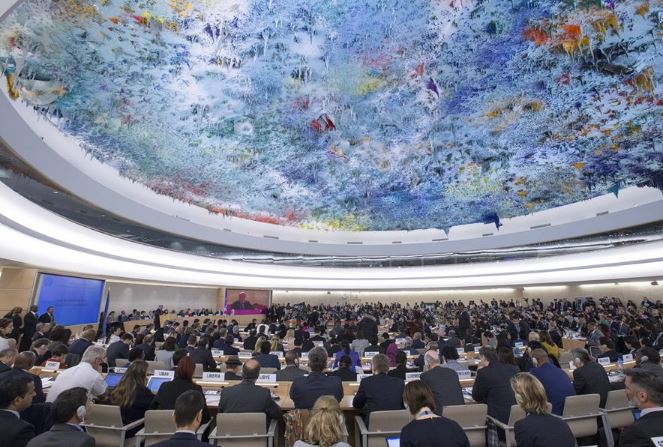
UN Secretary General Antonio Guterres delivers a speech at the opening of the 40th regular session of the UN Human Rights Council (UNHRC) in Geneva, Switzerland, February 25, 2019. The UNHRC opened its 40th regular session here on Monday. The delegates are to hear statements by some 100 high-level dignitaries in the coming weeks. (Photo: Xinhua)
UNITED NATIONS (Xinhua) -- The UN General Assembly on Thursday elected 14 states into the Human Rights Council to succeed outgoing members.
Through secret ballot, Libya, Mauritania, Nambia, Sudan (for Africa); Indonesia, Japan, the Marshall Islands, the Republic of Korea (for Asia-Pacific); Armenia, Poland (for Eastern Europe); Brazil, Venezuela (for Latin America and the Caribbean); Germany, the Netherlands (for Western Europe and other states), were elected for a three-year term starting Jan. 1, 2020.
Costa Rica for the Latin America and the Caribbean group; Iraq for the Asia-Pacific group; and Moldova for the Eastern Europe group lost their bids. Benin, which was not a regional group-endorsed candidate, got one vote.
Costa Rica, a latecomer in the race, was one vote short of the 97 votes needed for election. Iraq and Moldova, which, although passed the threshold of 97 votes, were outperformed by contenders in their respective groups.
Japan and Brazil were successfully re-elected.
The Geneva-based UN Human Rights Council is an inter-governmental body responsible for promoting and protecting human rights around the world. It has 47 members, about a third of which are replaced every year so that the council members serve staggered three-year terms for the sake of continuity.
Seats of the UN Human Rights Council are allocated on a regional group basis: 13 each for Africa and the Asia-Pacific; 8 for Latin America and the Caribbean; 7 for Western Europe and other states; 6 for Eastern Europe.
Except for Brazil and Japan, which are re-elected, 12 states will leave the Human Rights Council by year-end: Egypt, Rwanda, South Africa, Tunisia (for Africa); China, Iraq, Saudi Arabia (for Asia-Pacific); Croatia, Hungary (for Eastern Europe); Cuba (for Latin America and the Caribbean); Britain, Iceland (for Western Europe and other states).
Of the outgoing members, Britain, China, Cuba and Saudi Arabia were not eligible as they are already on their second consecutive term.
Costa Rica came rather late in the race to challenge Venezuela. In Thursday's vote, Costa Rica obtained nine votes fewer than Venezuela's 105 votes. Brazil in the same group won 153 out of the 193 total votes.
In other regional groups, the candidates for Africa and those for Western Europe and other states won comfortably as they were not challenged. In the Asia-Pacific group, Iraq lost to the Marshall Island by only two votes (121 for Iraq, 123 for the Marshall Islands). In the Eastern Europe group, Moldova fell short with 103 votes, compared to 144 for Armenia and 124 for Poland.


